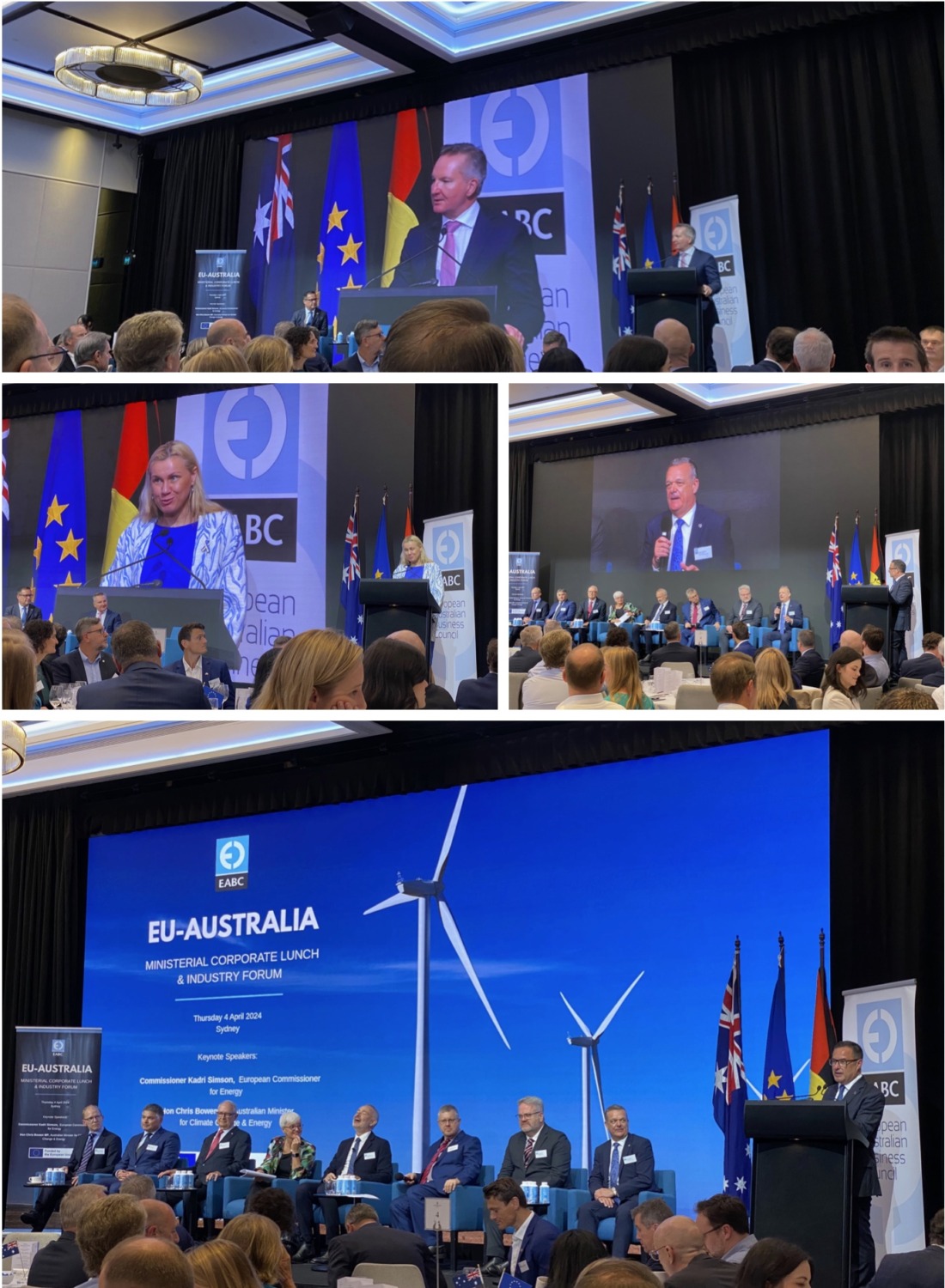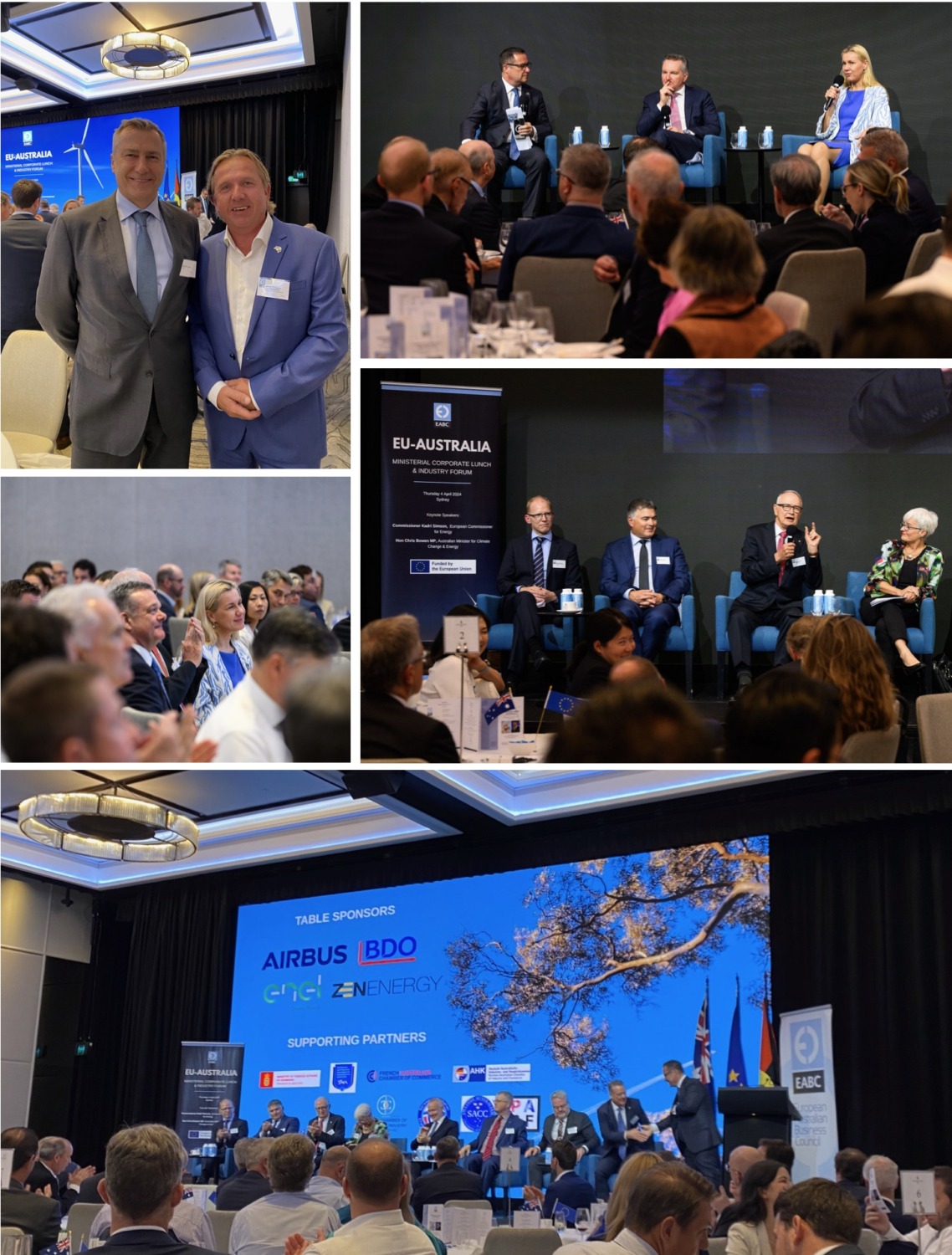EU-Australia Ministerial Lunch & Industry Forum – 4 April 2024, Sydney

On Thursday 4 April, the SACC and its members were invited to the European Australian Business Council’s Ministerial Corporate Lunch and Industry Forum with the European Commissioner (Minister) for Energy, Kadri Simson and Australian Minister for Climate Change and Energy Chris Bowen at the Four Seasons Sydney.
Here is a summary of the forum by SACC Member and participant Michael Luxton, President Asia Pacific at Arjo.
Forum Purpose
Commissioner Kadri Simson, European Commissioner (Minister) for Energy and Hon. Chris Bowen (MP) Australian Minister for Climate Change and Energy shared their vision for enhancing EU-Australia cooperation to overcome the critical challenges and capitalise on the significant opportunities of collaboration to achieve net-zero carbon emissions. Following the Ministers’ keynote speeches, an expert panel of leaders discussed Europe and Australia’s joint ambitions and capabilities for achieving energy and sustainable transition. The panel included:
- Brett Wickham, Managing Director, ACCIONA Energy Australia
- Professor Ross Garnaut AC, Director, ZEN Energy; Member, Net Zero Economy Agency Advisory Board
- Stephen Forshaw, Chief Representative, Airbus Australia, New Zealand and Pacific
- Martin Merrick, CEO, Volvo Group Australia
- Danny Nielsen, Senior Vice President and Country Head, Vestas Australia and New Zealand
- Daniel Westerman, CEO, Australian Energy Market Operator
Moderated by:
- Professor Emma Johnston AO, Deputy Vice-Chancellor (Research), The University of Sydney
- John Lydon, Co-Chair, Climate Leaders Coalition
Background Briefing provided by EABC Summary – EABC Simson and Bowen – 4 APR 2024
The transition to net-zero emissions by 2050 is one of the greatest challenges Australia, Europe and the global economy face. The transformation required is unprecedented in scale and complexity, underpinned by the transition of energy systems.
For Australia, it is estimated that investments totalling $1.9 trillion will be required in the energy sector alone to reach net zero by 2050. For the European Union on the other hand, an estimated €1.5 trillion of investment will be needed every year to reach its mid-century target. Investment in the energy sector alone will be required to reach €396 billion per year to achieve its 2030 targets and €670 billion per year from 2030 to 2040
Attendees
Delegates included senior representatives of EABC members, and a diverse range of European and Australian stakeholders including European ambassadors, trade promotion agencies, chambers of commerce, industry associations and companies.
Main takeaways
- Australia & the European Union are in close alignment with each other in respect to the acceleration of decarbonisation across our collective economies and moving towards a more sustainable approach to both production and consumption.
- Minister Bowen acknowledged that the EU is already a significant investor (50-60%) in the Australian renewable energy sector. But he would be extremely happy to see this triple! And has an open door policy to any Global CEO visiting Australian willing to achieve this goal.
- Recognition we must continue to focus on energy security with its significant influence on a countries national security. This risk was highlighted with the EU member country’s requirement to rapidly transition from a significant reliance on Russian energy to alternative sources including renewables. In some respect, this requirement has led to an acceleration of the later.
- Energy security will be underpinned by the transition to lower cost renewables as compared to coal.
- Australia will continue to accelerate the transition to renewables given the high cost of maintaining the current coal fired power stations and impending closures – already locked in.
- There was a strong link to the current FTA being negotiated between Australia & the EU. Particularly with respect to the need to “increase coordination on standards and regulations that will facilitate cooperation in areas ripe for growth including renewable energy, critical minerals, decarbonisation technologies, energy efficiency and circular economy solutions and green finance, to name a few.”
- Skills shortages will remain a significant challenge for Australia. Minister Bowen indicated, as an example, Australia has a shortage of 30,000 plus electricians required to support our renewable energy targets by 2030.
- The FTA will also assist the skills shortage with a more efficient visa process & recognition of professional qualifications allowing people to move in and out of Australia more easily.
- Consideration must be given to the circular economy, both with respect to full life cycle management of goods embedded with renewables e.g. EVs, but also the environmental impact in establishing renewable energy sources e.g. wind turbines. A good example was given of the reduced land clearing impact on modified trucks transporting and setting up wind turbines. And also the recycling of the wind turbines themselves into shoes?!
Comments from Industry Panel & Questions from the audience
Brett Wickham, CEO Acciona AU: Program currently in place for 300 female graduates to facilitate increased diversity in a male dominated industry.
Stephen Forshaw, CEO Airbus ANZ/Pacific: Local investment in Sustainable Aviation Fuels including a $300M investment in Jet Zero (using agricultural bi-products). Australia will require 10 Billion L of fuel annually by 2030. Investment in renewable powered planes will be much slower but is certainly in the pipeline for the next generation of planes.
Danny Nielsen, SVP Vestas ANZ: Significant investment in QLD manufacturing Wind turbine manufacturing plant.
Siemens Representative: Remarked the importance of always considering the circular economy – and not wanting to create a ‘cane toad’ effect, where the solution can be worse (for the environment) than the initial problem.
Martin Merrick, CEO Volvo Group Australia: Highlighted the significant investment in AU onshore manufacturing, the use of hydrogen powered vehicles in the future in addition to the current commitment to battery powered EVs, and mentioned 85% of their trucks can be recycled.
Prof. Ross Garnaut, Director ZEN Energy: Emphasised push back on the notion that Australia should aim for on-shore manufacturing and focus on those processes etc. that can add value to the supply chain. For example, Australia has a comparative advantage in producing goods embodying energy (low cost/low emission) and will remain in demand from North Asia & Europe.
Concluding comments on joint ambitions and capabilities for achieving energy and sustainable transition:
Martin Merrick, CEO Volvo Group Australia: Seek out the facts about climate change – if we don’t invest in transition now the future impact and cost will be huge.
Danny Nielsen, SVP Vestas ANZ: Plan for the next generations they are the ones who will live with the impact.
Daniel Westerman, CEO, Australian Energy Market Operator: Focus on the objective and plan around it.
Prof. Ross Garnaut, Director ZEN Energy: Everything that is possible today was not possible before – the impossible is possible!
The SACC thanks Michael Luxton, President Asia Pacific at Arjo, for sharing event highlights and a special thank you goes to the EABC team for inviting us to take part in this insightful and well organised event!

